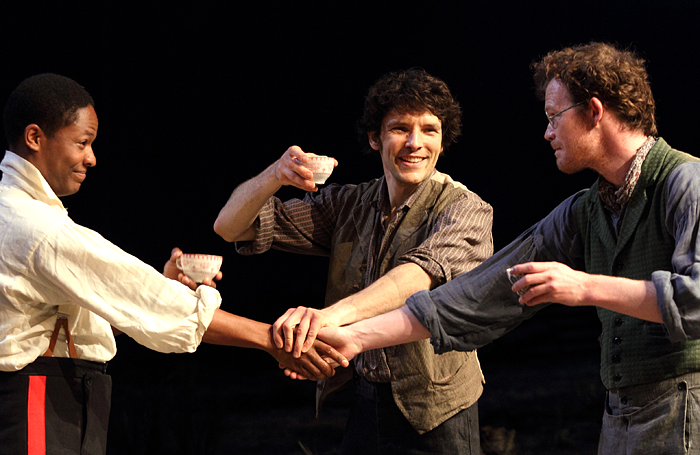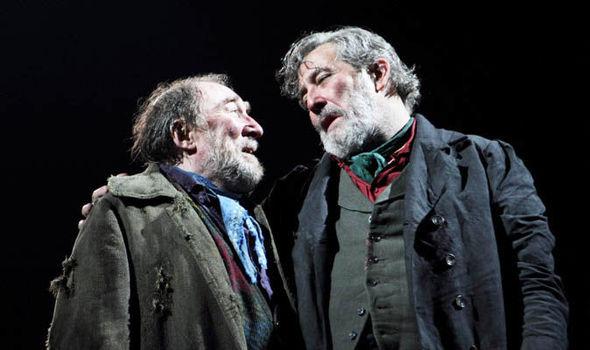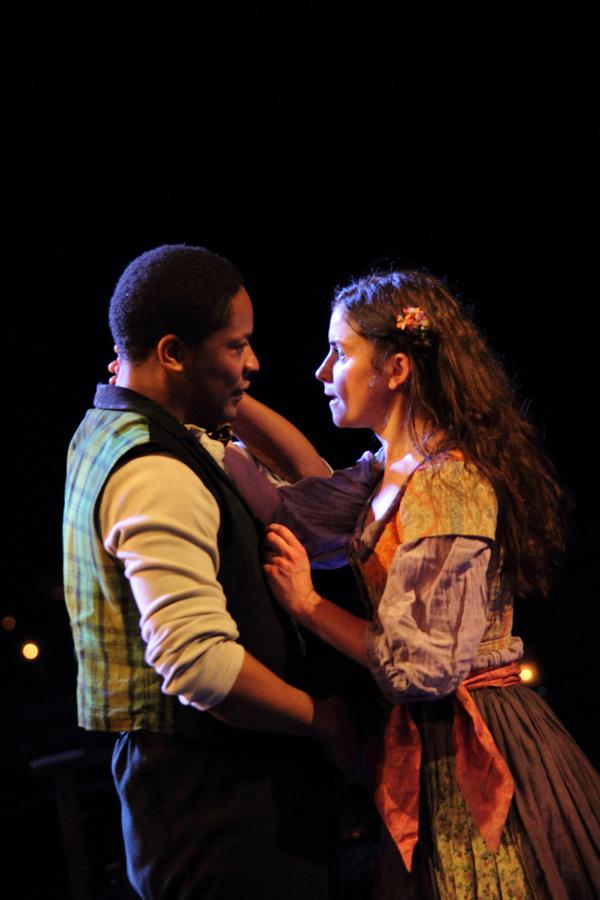Erin Kelly
 Written in 1980, Brian Friel’s play ‘Translations’ is considered by many to be a modern Irish classic due to its commentary on the erosion of the Irish language. The clash of culture and language takes place in Baile Beag, a Donegal village in 19th century agricultural Ireland, intimately displayed by Rae Smith’s design of the tattered Hedge School (scoil scairte) run by the scholarly Hugh O’Donnell (Ciaran Hinds). The popularity of hedge-schools went into decline from the 1830s, with the introduction of national schools set up by the British government and this signifies the transitional period of history that Friel was intent on capturing here with themes of language, communication and cultural imperialism. While the hedge-school in the play is going through this change, cartographers from the British Army, headed by Captain Lancey (Rufus Wright), are attempting to complete an Ordnance Survey, which aims to anglicise the Irish place names. Ironically, they’re translator is Hugh’s prodigal son, Owen (Colin Morgan) who has just returned from Dublin much to the annoyance of his brother the lame, put upon son, Manus(Seamus O’Hara). Friel portrays the different effect this Survey has on the people’s sense of identity subtly through Owen’s conflicting loyalties, through characters such as Maire (Judith Roddy), who views the English language as a sign of progression, encouraging the use of it in Ireland and mute Sarah (Michelle Fox) who even struggles to speak her native language and name where she lives in Irish.
Written in 1980, Brian Friel’s play ‘Translations’ is considered by many to be a modern Irish classic due to its commentary on the erosion of the Irish language. The clash of culture and language takes place in Baile Beag, a Donegal village in 19th century agricultural Ireland, intimately displayed by Rae Smith’s design of the tattered Hedge School (scoil scairte) run by the scholarly Hugh O’Donnell (Ciaran Hinds). The popularity of hedge-schools went into decline from the 1830s, with the introduction of national schools set up by the British government and this signifies the transitional period of history that Friel was intent on capturing here with themes of language, communication and cultural imperialism. While the hedge-school in the play is going through this change, cartographers from the British Army, headed by Captain Lancey (Rufus Wright), are attempting to complete an Ordnance Survey, which aims to anglicise the Irish place names. Ironically, they’re translator is Hugh’s prodigal son, Owen (Colin Morgan) who has just returned from Dublin much to the annoyance of his brother the lame, put upon son, Manus(Seamus O’Hara). Friel portrays the different effect this Survey has on the people’s sense of identity subtly through Owen’s conflicting loyalties, through characters such as Maire (Judith Roddy), who views the English language as a sign of progression, encouraging the use of it in Ireland and mute Sarah (Michelle Fox) who even struggles to speak her native language and name where she lives in Irish.
 Friel proposes the idea that personal identity blends with national identity and the act of re-naming gives one power as the enthusiastic Lieutenant Yolland (Adetomiwa Edun) says, ‘we name a thing and-bang! - it leaps into existence!’ This act of possession hints at Friel’s commentary on colonialism and through the metaphor of the Ordnance Survey Hugh implies that the linguistic contour will no longer match the landscape of fact once it has been anglicised.
Friel proposes the idea that personal identity blends with national identity and the act of re-naming gives one power as the enthusiastic Lieutenant Yolland (Adetomiwa Edun) says, ‘we name a thing and-bang! - it leaps into existence!’ This act of possession hints at Friel’s commentary on colonialism and through the metaphor of the Ordnance Survey Hugh implies that the linguistic contour will no longer match the landscape of fact once it has been anglicised.
Language, with all it’s ambiguities, is the focal point of the play, with moments such as the budding relationship between the naïve officer, Yolland, and the idealistic, Maire, when emotions seem to transcend language barriers. This perfectly displays the conceit used in the play where both nationalities can’t seem to understand one another; despite all the dialogue being in English. The ability of non-verbal communication to surpass cultural divides is portrayed not only through difference in national identity, but also ethnicity by the casting of actors Judith Roddy and Adetomiwa Edun. Both counterparts seem to be grasping for the right words to express themselves and end up using the names of places as a form of seduction. This simple but effective linguistic technique is almost comical at times, showing people incomprehensible to one another no matter what their status, captured through not only Captain Lancey’s condescending rhetoric but also Jimmy’s charming ramblings in Greek, Latin and Gaelic, whose eccentricity is excellently portrayed by Dermot Crowley.
 According to Friel, the play is ultimately about ‘language and only language’ and although there are socio-political implications, Friel didn’t want the play extending its influence into unrealised territories, stopping short at what it says and shows only. Language, however, is almost always political and Ian Rickson, the Director, seemed to find some truth in this connection as he ended the play with a political statement; a dramatic framing of one figure of an armed guard, towering above Baile Beag with wisps of smoke clouding his face. Written during the second decade of the Troubles, this may be a comment on the political relevance of the context of Friel’s production. This is not the original ending written by Friel so one might perhaps question the necessity of the National’s take on the ending for a play that should speak for itself and leave the audience to create their own interpretations.
According to Friel, the play is ultimately about ‘language and only language’ and although there are socio-political implications, Friel didn’t want the play extending its influence into unrealised territories, stopping short at what it says and shows only. Language, however, is almost always political and Ian Rickson, the Director, seemed to find some truth in this connection as he ended the play with a political statement; a dramatic framing of one figure of an armed guard, towering above Baile Beag with wisps of smoke clouding his face. Written during the second decade of the Troubles, this may be a comment on the political relevance of the context of Friel’s production. This is not the original ending written by Friel so one might perhaps question the necessity of the National’s take on the ending for a play that should speak for itself and leave the audience to create their own interpretations.
Despite ongoing questioning of whether the play is one of social drama, politics or, as Friel once said, an “inaccurate history”, Rickson’s revival in the Olivier has a wonderful element of simplicity. Stephen Warbeck’s melancholic score reinforces the idea of a strong community falling apart and paired with Smith’s design of the charmingly frayed Hedge School the sense of deterioration on many fronts is evident. Despite being a small, unlicensed, rural school (due to restrictive penal laws against Catholic Schools), the vast Olivier Theatre seems to project this intimacy. All these elements of production combined with flawless acting from the whole cast brings Friel’s engaging story of language and community to life, producing a play rich in atmosphere.
No comments
Post a Comment
Please only leave respectful and informative comments. Thank you!
Note: only a member of this blog may post a comment.